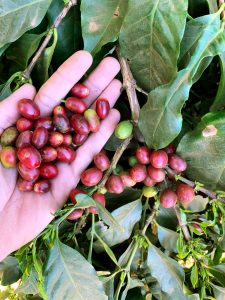Our Experimental Coffee Trees
News from Steve on coffee trees being cultivated in Brazil, exclusively for Zingerman’s
Latest Update: September 8th, 2021:
Our friends at Daterra Estate in Brazil have been working diligently despite the global pandemic on our ongoing coffee growing project, our plot of the Pacamara coffee varietal.
Our trees – which we, unfortunately, were not able to visit this year to said pandemic – continue to develop slowly but steadily. The report is similar to last year, and promising: harvest began a bit later than for other trees on the farm, not unusual for young trees. We continue to see lush vegetative growth – a good sign of healthy trees.
In June, 2021, 12-13 pickers began harvesting our Pacamara trees. An even more exciting sign that our trees are thriving are the abundant clusters of beautifully matured fruit.
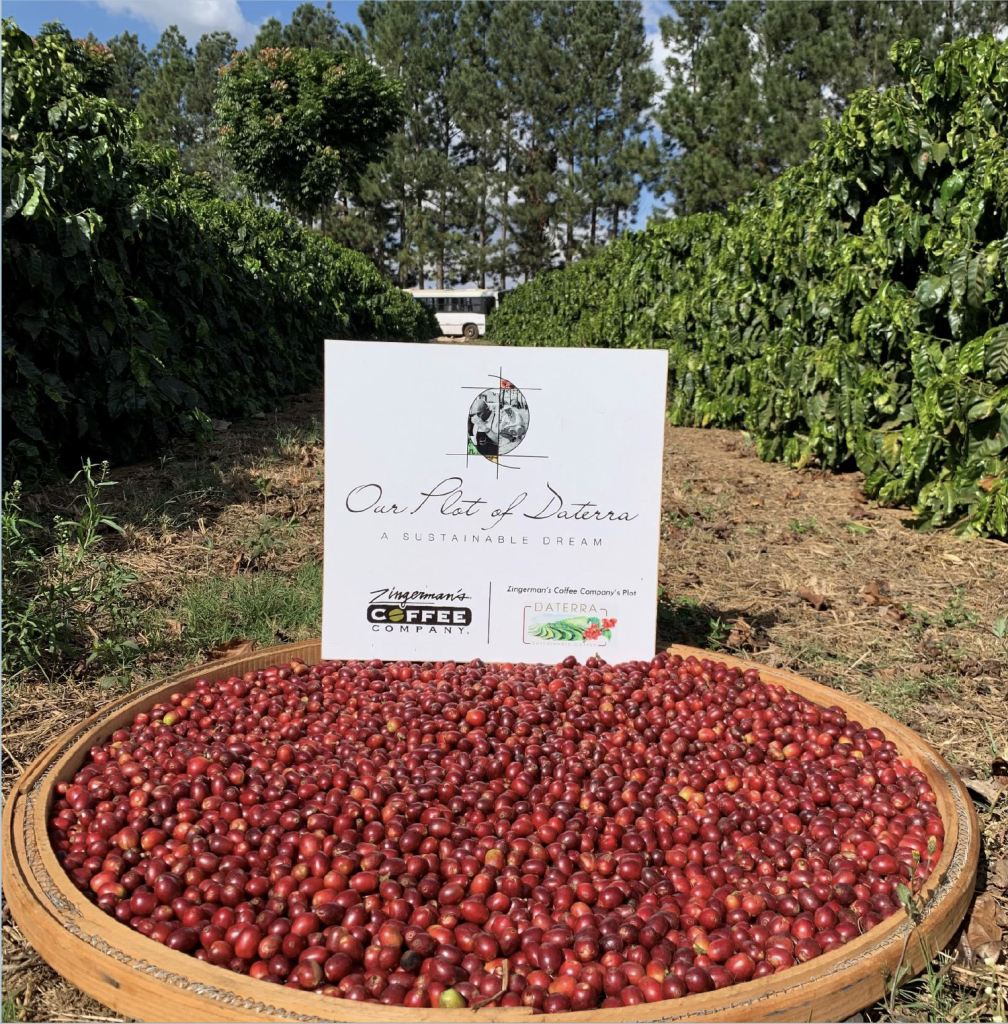
In Brazil, harvest is annual – once a year – and it starts around May, and finishes around August. Our beans matured beautifully; 98% of what you see in basket is matured coffee fruit.
Another exciting report from Daterra is that we’re reached the stage where our shade trees have produced a canopy. This means that we can indulge in the other part of our experiment: seeing how full-sun versus shade-grown affects taste.
After patiently waiting for five years for our plot to develop – with no certainty promised regarding its success – it’s wildly exciting to see such great results early on.
Our trees produced enough to allow us to experiment with a variety of processing methods.
The report back from Daterra:
- #1 washed. Tobacco, black tea, molasses, red fruit were the tasting notes.
- #2 was honey processed – fruity, orange, hazelnut, yellow fruits, citric fruits
- #3 was cherry fermented 24 hours. Ripe fruits, juicy, black plum, peach.
- #4 anaerobic fermentation 24 hours. Florals, orange, peach, tangerine, honey, floral nut.
- *#5 same but 48 hours (longest). Lots of orange, dark berries, raisins, red wine.
- *#6 Natural dried from ripe cherry. African style natural. Dried on raised bed.
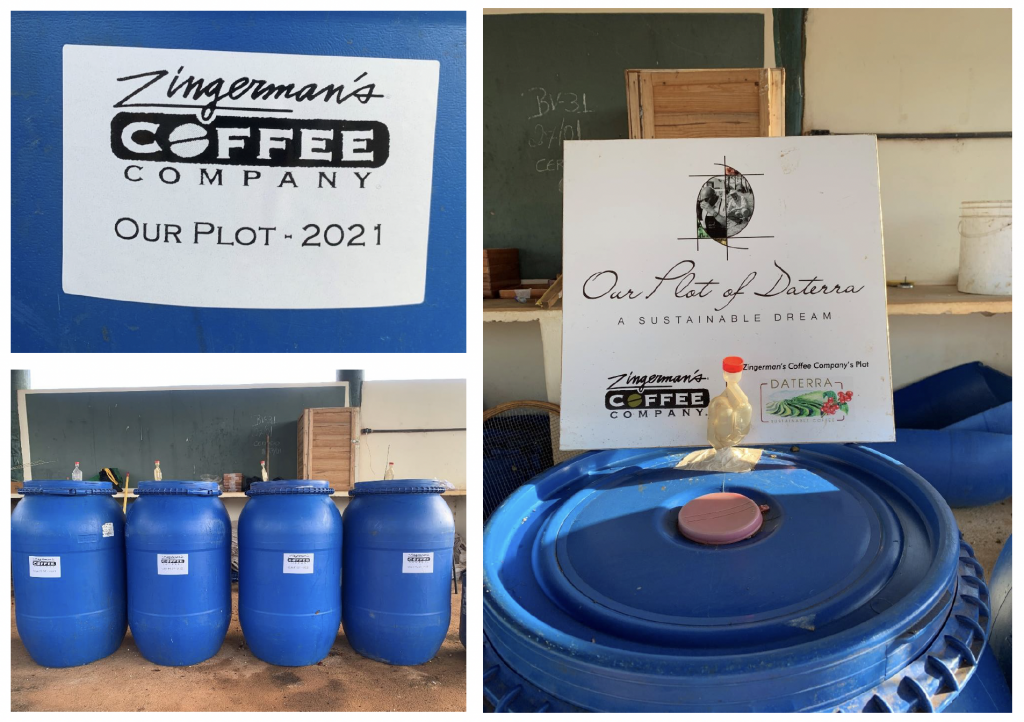
24 anaerobic fermentation. Fermentation occurs naturally with coffee fruit, but this process is controlled in vessels. The coffee fruit is deprived of oxygen to achieve a prized flavor profile.
The stand-out to the Daterra team was the anaerobic fermentation. They scored this coffee points above the rest, flavor profile-wise. Another stand-out – and one of our favorite processing methods – was the natural process. We’ve narrowed down to these two processing methods for the 2021 harvest.
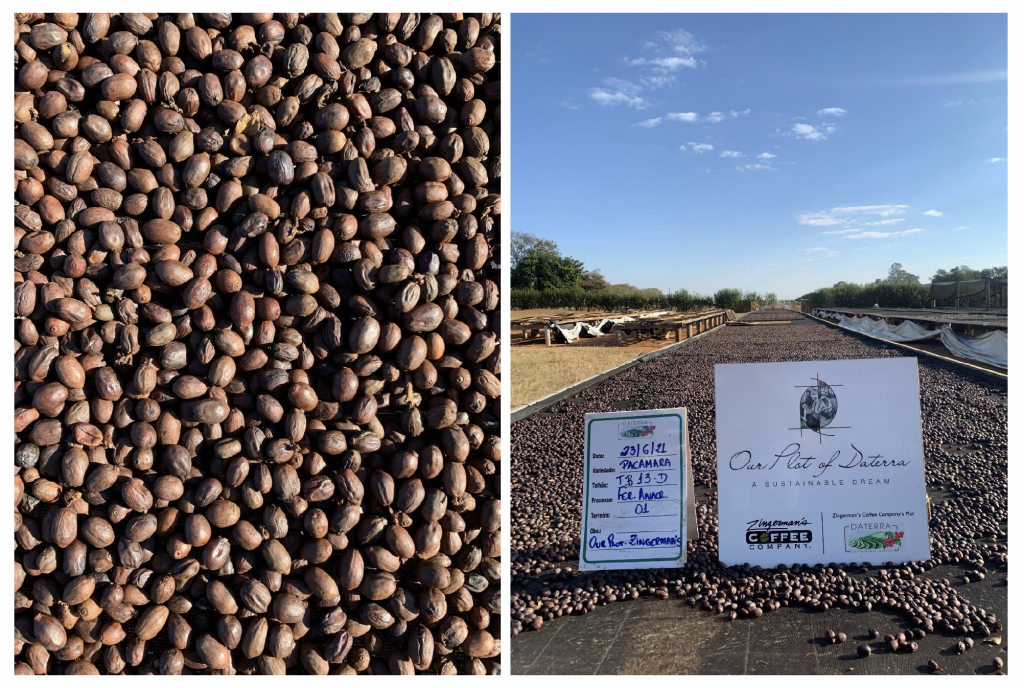
Coffee fruit dried on raised beds. This processing method raises the cherries off the ground and allows for air circulation. Clean cherries that have been dried consistently, like these, result in a consistent coffee.
This year, we did not separate shade-grown and full-sun – that’s an aspect of the experiment we’re looking forward to indulging in next year.
Update: August 20th, 2020:
The harvesting of our Pacamara coffee cherries is underway at the farm! The folks at Daterra Estate in Brazil began hand-picking our plot on July 7th. Everyone involved has been curious to see how these trees behave, given that they’re new (planted only four years ago) and foreign to Brazil. We were definitely expecting our Pacamara to be different, and indeed its coffee cherries matured less uniformly than more established and native plots on the farm.
With respect to our project specifically, the last round of picking should occur next week.
Last year, we shared a video of us trying this coffee for the first time – which was a treat, but the harvest was too small for us to really do anything with except for sample roast. We’re unsure of exactly how much the total production will be this year, but so far 6 boxes (23 kg. or 50 lbs.), have been picked. We’ll report the final tally once picking is officially done.
Closer to the end of the year, we’ll be receiving a shipment from the farm of our Pacamara coffee processed four distinct ways:
- Anaerobic
- Natural, Cerrado-style (dried on tree)
- Natural, traditional African method (dried on bed)
- Honey
- Washed
The team at the farm be cupping these coffees first, and will send their notes along with the coffees. We’ll then cup the coffee ourselves, and compare their notes against ours.
Be on the lookout for a live cupping of these coffees closer to the end of the year!
Update: May 15th, 2020:
I’m thrilled to be giving this update! We previously shared our excitement about an ongoing long-term project with our close coffee partners Daterra Estate in Brazil, cultivating the Pacamara varietal. Prior to embarking upon this project, I was struck by the immense size of the Pacamara coffee bean during my first-ever origin trip to El Salvador many years ago. I knew I had to do something special with this varietal. Pacamara has not traditionally been grown in Brazil, therefore our endeavor is rather experimental.
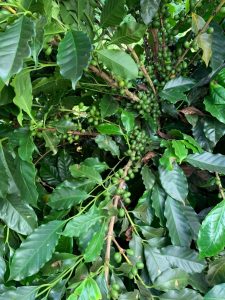
Youthful Pacamara varietal coffee beans – our experimental lot being grown at Daterra Estate in Brazil.
Our three-acre plot is on a high, flat plain in the Cerrado region near the city of Patrocínio. Daterra’s farms are located at an average altitude of over 3,000 ft and some terroirs are around 4,000 ft. The wind, sun and soil there are exceptional for Arabica trees. The diverse altitudes and microclimates on the farm make it one of the best coffee-producing areas in the country. With dry winds on pleasantly hot days and refreshingly cool nights, conditions are perfect for amazing beans to be grown.
Checking In On Our Trees
Although much of the world has slowed down, our little coffee trees continue to grow and thrive. We are more committed than ever to continuing this work to bring you the most exceptional coffee varieties we can find. Given the circumstances around the world this year, it’s not in the cards for us to make our annual trip down to Brazil to see the farm in person. However, updates continue!
After receiving some photos from the farm, I had a chance to video-conference with Gabriel Agrelli Moreira, Daterra’s head of international sales. We spoke about the status of our project and the current health of the trees on our experimental plot. An interesting observation they made is that Daterra’s agronomists are seeing a marked difference from other coffee trees on the farm. In the rest of the crop, Daterra is beginning to see maturation, which means the coffee cherries will be ready to harvest soon.
However, the Pacamara plot is actually about a month behind the rest of the farm! Our coffee cherries are still super green. Daterra is attributing that to both the trees still being quite young, and the typical coffee cherries of the Pacamara varietal being twice the size of a normal coffee cherry. These trees will be ready for picking by the end of this month, or beginning of June. Our estimate is that we’ll yield just 7 to 10 bags (132 lbs. or 60 kg. each) in total this year. However it is likely just 5 to 7 of them will be usable. After picking the coffee is processed, milled, and sorted, there is always a loss of volume.
The Details Matter In The Final Cup
Something interesting to note in coffee trees that’s perhaps not discussed often in the coffee world, is the difference between vegetative trees versus productive trees. Vegetative trees have lots of branches, leaves, tree structure, but not a lot of production. With mature, productive trees, it’s the opposite: we see lots of flowers, seeds, and cherries. From what we can ascertain thus far, our plot seems to be more vegetative. Even when fully grown, likely these trees will produce a “medium” amount of cherries. This may not sound ideal, but actually vegetative trees, while they produce less, tend to produce better quality cherries and coffees!
Low production for this year means our focus will be on determining a processing method(s) for the Pacamara. Of the dozen or so processing methods Daterra Estate is able to offer, we have asked that they use the honey, natural process on the tree (called “raisin”), natural processing on raised beds – a traditional African processing method, washed, and anaerobic.
Another aspect of our experiment is determining taste differences between coffees grown under shade as well as full sun exposure. The mahogany trees planted alongside the Pacamara trees are still young, so shade hasn’t been quite established. We have learned that those trees may still take a few years of growth before we see any tangible benefit. We hope our patience will be rewarded!
Love At First Sip
I fell in love at first sip with the Pacamara coffee (see the short video). It has an intense plum flavor that is really pleasant. I really can’t wait to invite you in for a taste, and share the fruits of our growing experiment with you in the future.
Stay tuned! Subscribe to our E-News or follow us on Facebook, Instagram, or Twitter, so you be alerted when this very special coffee is released!
Warmly,
Steve
Steve Mangigian, Zingerman’s Coffee Company Managing Partner


